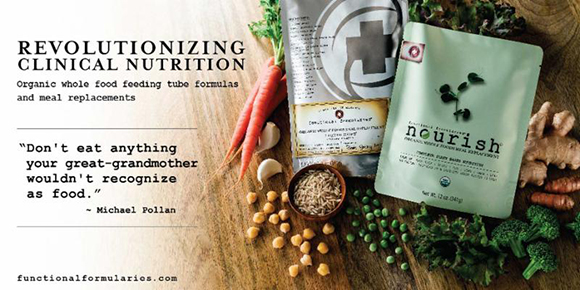Thank you for your continued support of Today's Dietitian.
Below is information from one of our sponsors.

Planning to attend Today's Dietitian Symposium in Austin? Functional Formularies will be there at Booth #33
Functional Formularies Recent Clinical Trial

A recently completed study at University of Pittsburgh Children's Hospital provided significant insight into the protective role of an organic, whole food enteral formula on the GI. Mice with colitis were fed either Liquid Hope or one of two other polymeric enteral formulas for one week. Each group of mice was fed the same volume of their specific enteral formula for one week. Upon completion, the mice were weighed, several markers of inflammation were measured, and various microbial populations were assessed, particularly those that research has linked to a higher or lower risk for infection. In addition, several other biomarkers that influence intestinal inflammation were examined and compared across groups.
Those mice fed the Liquid Hope formula had significantly less inflammation, larger populations of protective bacteria, markedly less infection-causing bacteria, and larger quantities of molecules that offer unique health benefits, particularly to the intestinal environment. Additionally, Liquid Hope-fed mice were able to gain or maintain weight on their formula while the other groups of mice fed the same amounts of energy, protein, and formula overall, experienced the weight loss that is expected in mice (and in humans) with colitis.
Two families of bacteria that often play important roles in protecting against opportunistic GI and/or other antibiotic-resistant infections, Lachnospiraceae and Ruminoccocus were able to maintain healthy levels in those mice receiving Liquid Hope. In contrast, these and many other families of microbes disappeared in the mice receiving the more refined formulas. These families of bacteria have the potential to influence intestinal inflammation in a favorable way (3) and low levels may be associated with gut-mediated neurological disease (4). In the case of Lachnospiraceae, they may also be very effective at outcompeting pathogens such as C.difficile and Candida albicans, common infections or overgrowths experienced by those with extended hospital stays.
While more beneficial bacteria survived and maintained healthy populations, some pathogens such as Enteobacteriaceae decreased significantly within the mice receiving the organic, whole food formula. Enterobacteriaceae is one of the most common sources of systemic infection for those staying in hospitals (5) and is commonly found in the enteral feeding tubes of children within PICUs (6). It tends to show up in higher levels with greater overall inflammation (7). Seeing less Enterobacteriaceae is always a good thing and the Liquid Hope fed mice had dramatically lower levels than those mice receiving other formulas.
Of equal interest were major differences in bile acid metabolites and antioxidant levels. Lithocholic acid (LCA) is a derivative of bile acid with potent anti-inflammatory properties. It has also been shown to help reduce host levels of autoimmunity by interacting with the vitamin D receptors on white blood cells and better regulating where our defense system applies its force (8,9). Bile acid is converted to LCA by beneficial bacteria such as Ruminoccocus and beneficial species within the Clostridiale family of bacteria (10,11), thereby making something protective out of what would otherwise be potentially damaging to the gut wall. Both of these families were at much higher levels within the Liquid Hope-fed mice, so these results would be expected.
Lastly, an increasingly appreciated antioxidant and anti-inflammatory polyphenolic, hydroxycinnaminic acid (HCA), was found at significant levels within the digestive tracts of the Liquid Hope-fed mice. HCA is clinically relevant to conditions of intestinal inflammation as it has been shown to exert influence on markers associated with greater risk of complications. This is yet another benefit to consuming an organic, whole food enteral formula that contains ingredients such as rosemary and turmeric. Of course the most important finding in all of this was the overall better level of health observed by the investigators. As they summarize in their conclusion, "Mice fed LH in this model of gut inflammation had superior outcomes compared to mice fed the other commonly used enteral formulas."
Read full abstract here.
~ John Bagnulo MPH, PhD.

Stop by Functional Formularies at Booth #33 during Today's Dietitian Symposium in Austin, Texas to learn more about our products and this clinical trial from our team members Jeff Ensminger and Katie Bishop.
If you would like to learn more about or products please visit our website at www.functionalformularies.com. If you have any questions or would like to request samples and/or literature please contact us at 937-433-4693.
Any questions please contact:
Pamela R. Cone, Marketing Coordinator
937-466-9042
pamela@functionalformularies.com
Functional Formularies is a privately owned company located in Centerville, Ohio. The company manufactures the world's first certified organic, nutritionally complete, shelf-stable feeding tube formula and oral meal replacement products: Liquid Hope, a sole-source nutrition formula for adults and Nourish, optimized for pediatrics.
Stay Connected